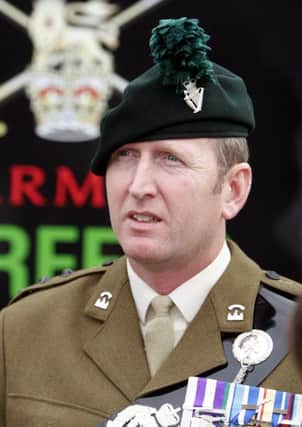Beattie welcomes funding study


On Monday, University of Ulster confirmed that it had secured over £355,000 of funding for a landmark study into the support and services available to armed forces veterans and their families living in this country. This will mark the first time that research on Northern Ireland’s veteran community will be carried out.
Councillor Beattie, who has served in the military for thirty-three years, explained that this research could lead to ‘protection for the most vulnerable’.
Advertisement
Hide AdAdvertisement
Hide Ad“I remember as a young lad looking at my father as he stood in his Ulster Defence Regiment uniform,” Cllr Beattie shared.
“Having served for 22 years in the Royal Ulster Rifles and Royal Irish Rangers he joined the UDR on our family’s return home. I have a single mental image of my mother in her Greenfinch uniform, a part time military career cut short by cancer. Despite the republican agenda to discredit the UDR, I was proud of my parents and still am. They joined to defend all communities in the town where we lived during the worst terrorist campaign the United Kingdom has ever known.
“When the Belfast agreement was signed in 1998 many terrorists were released into society. But as these people began to become part of the everyday fabric of Northern Ireland society as politicians, lawyers, teachers and local community workers, the very men and women who had protected us through this violence began to slip into the shadows. Not through any sense of shame but for protection, to maintain security for them and their families from those euphemistically called ‘the dissidents.’
“I therefore welcome the news that the University of Ulster has secured a major grant of over £355,000 from the Forces in Mind trust to conduct a study into the support and needs of the service community in Northern Ireland. It will look at healthcare and mental health needs, as well as determine the size of the service and ex-service community in Northern Ireland. Over a three year period it will map out those who served their country in the Army, Air Force and Navy including those who served in the UDR and the Royal Irish Regiment Home Service Battalions.”
Advertisement
Hide AdAdvertisement
Hide AdCllr Beattie also voiced his enthusiasm for a second study, which is due to be carried out at Queen’s University, Belfast.
“Queens University has also been awarded over £96,000 to study the effects on military personnel of Counter Insurgency Operations, known as COIN, during decolonisation wars in the 1950s and 60s,” he explained. “It will also look at the experiences of those in the UDR during the Troubles in what became the British military’s longest ever operational campaign, known as Op BANNER.
“I went on to join the British Army following in the footsteps of my parents and my two elder brothers. After over 33 years of military service I now serve my community as my parents did but thankfully as an Ulster Unionist Councillor and not as a soldier on our streets. It is right that I continue to fight for the recognition these service personnel deserve in line with what is on offer to their counterparts in England, Scotland and Wales, because their sacrifice has brought us the relative peace we have today.
“If political parties are truly representative and genuinely want equality for all and protection for the most vulnerable, then they must acknowledge that some of the most vulnerable are ex British servicemen and women. The results of these studies will mean that Westminster can no longer ignore the plight of those they asked to stand up and serve when their country needed them most.”
Anyone wishing to contribute to this research in confidence should contact Dr Cherie Armour at Ulster University via email on [email protected]